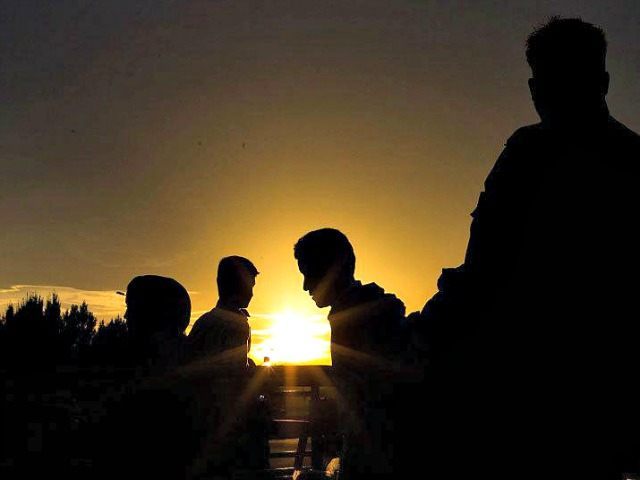Persecution in Turkey has forced many of the 45,000 Christians, who fled the Islamic State (ISIS/ISIL) in Iraq and Syria, to hide their true identities and pretend to be Muslim.
The Armenians, Syriacs, and Chaldean Christians received residency in Turkey until 2023, but they have applied to go to the U.S., Canada, or Austria. Syriac and Armenian Patriarchates, non-governmental organizations (NGOs), and other human rights groups do as much as they can to support the families, but they need more.
Hürriyet Daily News spoke with Armenian Anonis Alis Salciyan and her family, who left Iraq over a year ago. They are a family who pretend to be Muslim in public, but worship privately at home. The children cannot attend school because they do not speak Turkish.
Linda and Vahan Markaryan fled Baghdad a year ago with their two children after the Islamic State raided their home.
“When ISIL militants raided our house in Baghdad last year, my daughter Nuşik was seven,” explained Linda. “She stopped talking on that day and has never spoken again since then. We are now living in Yozgat. We are working hard to provide her treatment, but she still won’t speak.”
She added, “We do not have a future here. Everything in our lives is uncertain. Our only wish is to provide a better future for our children in a place where they are safe and secure.”
Her husband cannot find a permanent job as an electrician; instead, he takes temporary jobs at construction sites. These jobs only pay him 25 Turkish liras ($8.28) a day.
Others have been attacked in Turkey because they are Armenians.
Armenian Zadig Kucuk found his mother, Maritsa Kucuk, 85, dead in December 2012 in a large Armenian community in Istanbul. He claimed the murderer carved a cross into her chest.
That same month in the same community, attackers beat and choked an 87-year-old woman. The attack took her eye.
Attackers beheaded a 40-year-old teacher from an Armenian school in January 2013.
Turkey has prominence in Christian history since “the apostle Paul and Timothy were born there and the city of Antioch, now Antakya, was known as the ‘cradle of Christianity.'” Over 100 years ago, the Ottoman Empire committed the Armenian Genocide, killing over 1.5 Armenians, mostly Christians, as they forced the countrymen to leave Turkey.
Anonis said:
My family was originally from [the southeastern Turkish province of] Van. My husband’s family came from [the southeastern province of] Gaziantep. My husband and I fled [Iraq] with our two children one year ago with around 20 other families. There was pressure on us in Iraq.
The Christian population of Turkey is evaporating rapidly. The nation, a NATO member since 1952, has experienced a reduction in its Christian population from 20 percent 100 years ago to only 0.2 percent today. That change came into stark relief at the Hagia Sophia during Easter holy week in April 2015.
“The historic Istanbul cathedral and museum, Hagia Sophia, witnessed its first Quran recitation under its roof after 85 years Saturday,” reported the Anadolu News Agency of Turkey. “The Religious Affairs Directorate launched the exhibition ‘Love of Prophet,’ as part of commemorations of the birth of Islamic Prophet Muhammad.”
Istanbul was once known as Constantinople, founded by Roman Emperor Constantine in 324. He made it the capital of Rome before it fell to the Ottoman Empire in 1453. They made it their capital until the empire collapsed after World War I. Modern day Turkey officially renamed it Istanbul in 1923.
Turkey changed the name, but current officials have clearly indicated a desire to return to the Islamist state established under the Ottoman Empire. The Turkish Council of Ministers, for example, formed the Istanbul Conquest Society to help organize a yearly event to celebrate the conquest of Constantinople. As columnist Constantine Tzanos asks, “Why would anyone want to celebrate the conquest which not only by itself was a great human catastrophe, but it was also the precursor to many such catastrophes up to the very recent past?” The Ottomans terrorized the Balkans, killing anyone who did not convert to Islam. Historian H. Gandev believes “2,608 Bulgarian villages disappeared,” while the “rural population decreased by a total of 112,144 households (or approximately 560,000 people).” The post-Ottoman Turkish government repeated their predecessor’s history with the Armenian, Greek, and Assyrian genocides in Asia Minor, which led to the deaths of over three million people.
Turkey’s population is at least 97 percent Muslim, including President Recep Tayyip Erdoğan. Many have accused the president of being a radical Islamist, especially since he attempted to justify the execution of a Shiite cleric in Saudi Arabia. He also condemns anyone who dares acknowledge the Armenian genocide.
Turkey became a mostly Muslim country due to a “population exchange” with Greece. In 1923, “more than a million Greeks were forced out of Turkey to Greece while 300,000 Muslims from Greece were relocated here,” writes Cengiz Aktar. The Greeks who stayed faced massive taxes and anti-Greek programs, which eventually forced them out.
“The ethnic cleansing of these non-Muslim minorities was a huge brain drain,” Aktar adds. “It also meant the disappearance of the bourgeoisie because not only were they wealthy but they were artisans. Istanbul lost its entire Christian and Jewish heritage.”

COMMENTS
Please let us know if you're having issues with commenting.